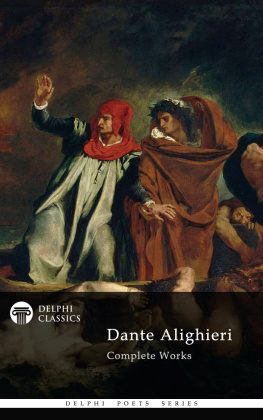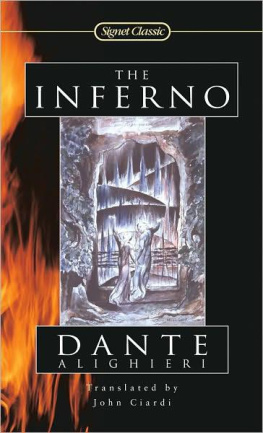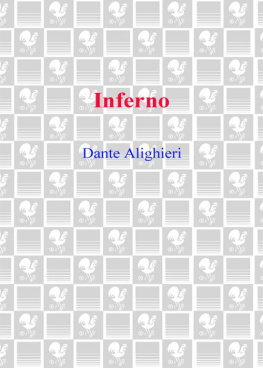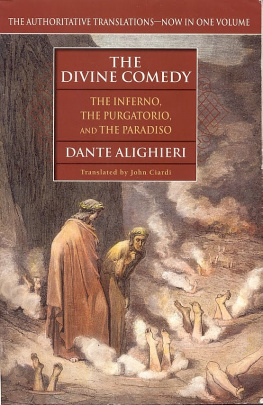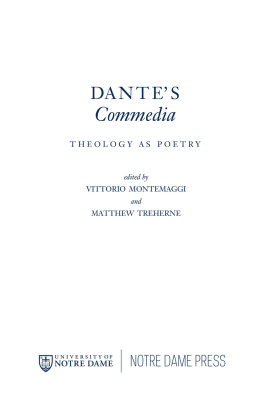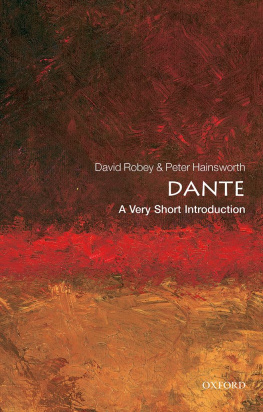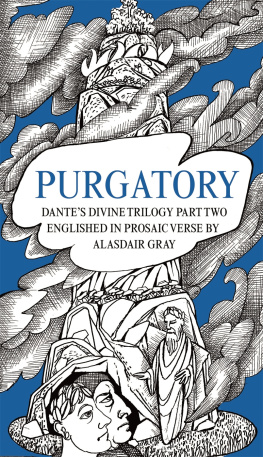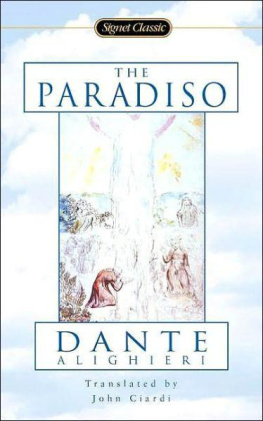Dante Alighieri - Dantes The Divine Comedy - Paradiso
Here you can read online Dante Alighieri - Dantes The Divine Comedy - Paradiso full text of the book (entire story) in english for free. Download pdf and epub, get meaning, cover and reviews about this ebook. year: 2012, publisher: Knopf Doubleday Publishing Group, genre: Religion. Description of the work, (preface) as well as reviews are available. Best literature library LitArk.com created for fans of good reading and offers a wide selection of genres:
Romance novel
Science fiction
Adventure
Detective
Science
History
Home and family
Prose
Art
Politics
Computer
Non-fiction
Religion
Business
Children
Humor
Choose a favorite category and find really read worthwhile books. Enjoy immersion in the world of imagination, feel the emotions of the characters or learn something new for yourself, make an fascinating discovery.

- Book:Dantes The Divine Comedy - Paradiso
- Author:
- Publisher:Knopf Doubleday Publishing Group
- Genre:
- Year:2012
- Rating:3 / 5
- Favourites:Add to favourites
- Your mark:
- 60
- 1
- 2
- 3
- 4
- 5
Dantes The Divine Comedy - Paradiso: summary, description and annotation
We offer to read an annotation, description, summary or preface (depends on what the author of the book "Dantes The Divine Comedy - Paradiso" wrote himself). If you haven't found the necessary information about the book — write in the comments, we will try to find it.
Dantes The Divine Comedy - Paradiso — read online for free the complete book (whole text) full work
Below is the text of the book, divided by pages. System saving the place of the last page read, allows you to conveniently read the book "Dantes The Divine Comedy - Paradiso" online for free, without having to search again every time where you left off. Put a bookmark, and you can go to the page where you finished reading at any time.
Font size:
Interval:
Bookmark:

The Library of Congress has cataloged the Doubleday edition as follows:
Dante Alighieri, 12651321.
[Paradiso. English]
Paradiso / Dante Alighieri ; a verse translation by Robert & Jean Hollander ; introduction & notes by Robert Hollander.
p. cm.
I. Hollander, Robert, 1933 II. Hollander, Jean, 1928
III. Title.
PQ4315.4.H65 2007
851.1dc22
2007018070 eISBN: 978-0-307-80595-9 Author photographs Pryde Brown
Cover painting: Annunciatory Angel by Fra Angelico,
Bequest of Eleanor Clay Ford/The Detroit Institute of Arts/The Bridgeman Art Library
Cover design by Kathy DiGrado
Book design by Pei Loi Koay www.anchorbooks.com v3.1 forCornelia (A.R.)& Dr.
Buzz
Needless to say, we have again attempted to give as accurate a sense of the poetry and meaning of the Italian text as the English language and our abilities allow. The language and style of this part of the poem are, in many respects, dramatically different from those to which the reader has become accustomed in the previous cantiche. As we suggested in the front matter for the second volume, While surely we must acknowledge that Inferno and Purgatorio are very different poetic places, they nonetheless maintain some arrestingly similar elements. From the vantage point of Paradiso the second canticle looks much more like its predecessor than like its successor. Indeed, Paradiso is not only unique within Dantes oeuvre; it is simply unique. Theology set to music, as it were, it pushes its reader (not to mention its translators) to the limit.
A particular problem facing translators of the Paradiso involves one of its distinguishing features: neologisms, or words new to the Italian language and essentially invented by their creator. The current estimate of the number of neologisms in the poem runs to around ninety, with the great bulk of these appearing in Paradiso (see Ferrante [Ferr.1983.1], p. 131, n. 10). It seems appropriate that the requirements of expressing the higher realities of Gods realm involve linguistic novelties of the most radical kind. Some of these we have attempted to bring over into English, when Dantes coinage seems so striking that any reader would have to pay astonished attention to the violence done standard Italian; for example, the verb intrearsi (Par.
XIII.57), literally to inthree itself, which Dante employs to speak of the Holy Spirits involvement with the other two Persons of the Trinity, and which we have translated with an English neologism, the Love that is intrined with them. Others we have not, especially when it seemed to us that his usage borders on the ordinarily daring language one associates with almost any poetic making, for example, the verb ingigliarsi (Par. XVIII.113), which literally means to enlily itself, but is fairly obviously meant to indicate what our translation suggests it does, i.e., to make itself into a lily. In other words, the first class of neologisms is the linguistic equivalent of self-consciously audacious metaphor, and, like it, is obviously intended to make a reader reel, while the second is closer to our normal expectations of heightened poetic language; it may surprise, but does not shock. It is, naturally, not exactly easy to make such distinctions. It is also true that the difficulty of bringing the effect of a neologism into a second language is another complicating factor.
Sometimes Dantes daring thrusts simply do not feel right in English. In short, the reader should be aware that our practice in this regard is various. We are once again grateful to two friends born in Italy and born to Dante for their willingness to sample our translations and my footnotes with a knowing eye. Margherita Frankel, formerly a professor of Italian at New York University, was her usual careful and exacting self as she examined our materials. The same must be said of Simone Marchesi, who studied with me when he was a graduate student at Princeton and has now returned to the university to teach students how to read Dante in his own courses. We are pleased to express our continuing gratitude to them both.
This translation has brought us into contact with people whom we did not know before. It has been pleasing to hear from readers in this country, England, and Australia who have enjoyed our English-speaking Dante. And two of them were not only appreciative, but helpful. Professors of law Clayton Gillette (NYU) and Stephen Morse (Pennsylvania) paid for their enjoyment of Inferno by reading the penultimate drafts of Purgatorio and of Paradiso and sharing their questions and comments with us; we are deeply grateful to both of them, in part for demonstrating to me exactly why I have always used the adjective lawyerly (as in a lawyerly argument) in a positive sense. Finally, I would like to acknowledge those graduate students who worked with me on this cantica, first in 1980 (Carolyn Calvert Phipps, Micaela Janan, Albert Rossi, Stephen Rupp, Alex Sheers) and then in 1986 (Sheila Colwell, Roberta Davidson, Martin Elzinga, Frank Ordiway, Lauren Scancarelli Seem). I hope that their memories of those seminars glow half as bright as mine.
Gerald Howard, in addition to his more significant titles and duties at Random House, has been our editor for some years now. It was his support that made publication of our work possible and his continuing clear-headed and keen-eyed editorial supervision that has helped keep the project on an even keel. And we are grateful as well to all at Random House and Anchor Books (including three former students of mine at Princeton: Rakesh Satyal, Alice Van Straalen, and Anne Merrow) who have taken such obvious pleasure in their association with this project. 27 November 2005 (Hopewell) This first Anchor edition has some sixty changes in the translation, some thirty in the commentary, and six additions to the bibliography.
Font size:
Interval:
Bookmark:
Similar books «Dantes The Divine Comedy - Paradiso»
Look at similar books to Dantes The Divine Comedy - Paradiso. We have selected literature similar in name and meaning in the hope of providing readers with more options to find new, interesting, not yet read works.
Discussion, reviews of the book Dantes The Divine Comedy - Paradiso and just readers' own opinions. Leave your comments, write what you think about the work, its meaning or the main characters. Specify what exactly you liked and what you didn't like, and why you think so.

